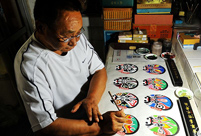 Happy life in Xinjiang
Happy life in Xinjiang
 2014 China Hainan Int'l Automotive Exhibition kicks off
2014 China Hainan Int'l Automotive Exhibition kicks off
 Collection of 'China Dream' public-spirited ads
Collection of 'China Dream' public-spirited ads
 The silent holy stones
The silent holy stones
 University students take care of giant pandas
University students take care of giant pandas
 Leading lady a true legend
Leading lady a true legend
 China Pan-Asia Stone Expo held in Kunming
China Pan-Asia Stone Expo held in Kunming
 Taiwan woman marries into Kazak family, 100 sheep plus a flat as dowry
Taiwan woman marries into Kazak family, 100 sheep plus a flat as dowry
 College girls take graduation photos under water in Chongqing
College girls take graduation photos under water in Chongqing
 Cartoon: Xi and football
Cartoon: Xi and football
CHANGCHUN, July 16 -- Sitting in the stands at the World Cup in Brazil, He Wei encountered the same question again and again: What is a Chinese guy doing here?
The question is reasonable. The lousy Chinese national team has failed to qualify for the world's most important football event since 2002 -- not even close.
"Maybe it's better to say I came here to help Brazil build railways?" He, a popular football commentator, wrote on his microblog.
Besides the self-mockery, the joke reflects the desire of Chinese companies to cash in on emerging Latin American countries' huge appetite for railways.
In an article on its website on Tuesday, China CNR Corporation Ltd. said it has secured orders for 100 electric multiple units (EMU), a type of intercity high-speed train, and 34 subway trains for Rio de Janeiro over the past five years.
The company has delivered 42 EMU and 19 subway trains and vehicles provided by the company now make up 80 percent of trains in the city that staged the World Cup final. A four-car EMU is capable of carrying 1,300 people, can run at 100 km per hour and is equipped with an advanced air-conditioning system to withstand the Brazilian heat.
Over the past month, the trains have shuttled between Central Station and the Maracana Stadium transporting football fans from across the world.
China is Latin America's third largest trading partner -- nearly 262 billion U.S. dollars in 2013 -- and Latin America has become a major export destination for China CNR. The company has also sold trains to Argentina.
CNR started researching the Latin American market in 2004. In 2007 Rio de Janeiro was chosen to host the 2014 World Cup and 2016 Summer Olympics. At that time, the government of Rio de Janeiro vowed to improve the city's rail network within five years and, in 2009, signed a contract with CNR for 30 EMU. Three years later, they ordered another 60.
"Compared with companies like Siemens and Alstom, we were rookies," Ma Lie said, recalling the public bidding for intercity trains. Ma is a senior manager with CNR Changchun Railway Vehicles, the subsidiary that manufactures the trains.
The company offered more cost efficient solutions and tailored services to win customers. "So far," Ma said, "we have signed contracts worth 1.5 billion U.S. dollars with Latin America."
 Moms on their kid’s coming out
Moms on their kid’s coming out Chinese fighters through lens
Chinese fighters through lens
 Children attend gymnastics training in summer
Children attend gymnastics training in summer
 Beautiful sceneries along the special travel route in Xinjiang
Beautiful sceneries along the special travel route in Xinjiang
 Beauty SWAT member in Xinjiang sparks online frenzy
Beauty SWAT member in Xinjiang sparks online frenzy
 Germany beat Argentina 1-0 to win World Cup
Germany beat Argentina 1-0 to win World Cup
 National fitness team members integrate traditional and modern beauty
National fitness team members integrate traditional and modern beauty Collection of 'China Dream' public-spirited ads
Collection of 'China Dream' public-spirited ads  How Chinese men kill the time when their wives practice square dancing?
How Chinese men kill the time when their wives practice square dancing? China's largest 3D printer builds 2-meter-long boat
China's largest 3D printer builds 2-meter-long boat
 One-legged women with high heel goes viral on Internet
One-legged women with high heel goes viral on Internet Photos of the Week
(July 6 - July 12)
Photos of the Week
(July 6 - July 12)
 'Super moon' seen in Beijing
'Super moon' seen in Beijing
 Happy life in Xinjiang
Happy life in Xinjiang
 'Finding Nemo' in Seattle Aquarium
'Finding Nemo' in Seattle AquariumDay|Week|Month